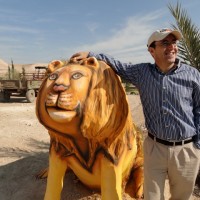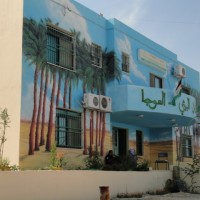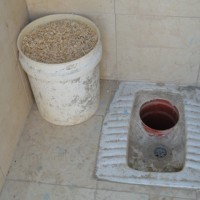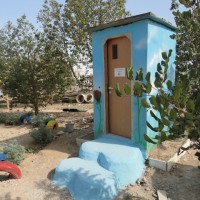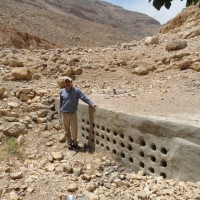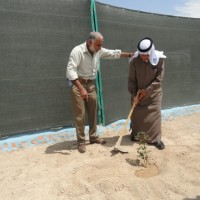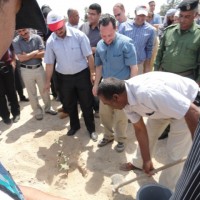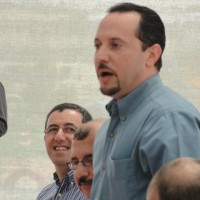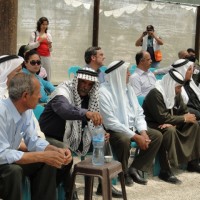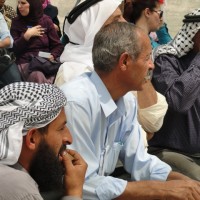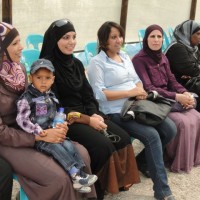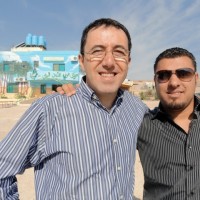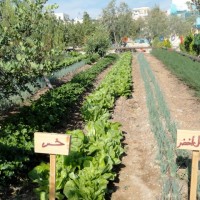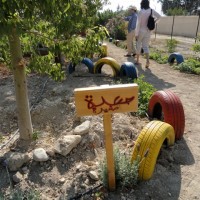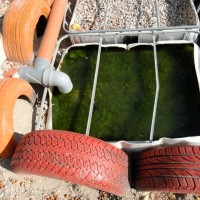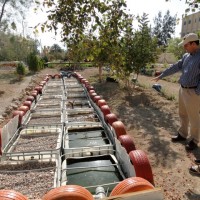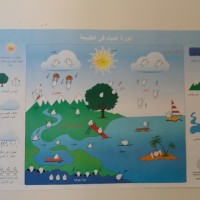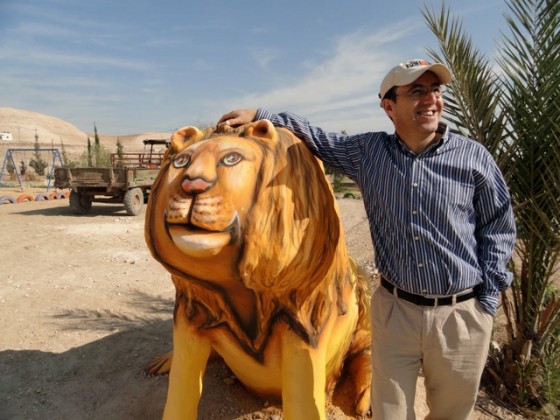 A visit to Auja, Palestine can open the world’s eyes to sustainable peace through water.
A visit to Auja, Palestine can open the world’s eyes to sustainable peace through water.
It starts with water and ends with a Debka dance: Friends of the Earth Middle East, a trilateral Israel-Palestine-Jordan non-profit organization has launched an unbelievably hopeful project based on water in the West Bank village of Auja, about 10 minutes from the city of Jericho in the Jordan Valley.
Probably not since the Roman times when an aqueduct ran through the village, has something this exciting came to Auja (said oo-jah), a rundown and dusty Palestinian village of about 5,000 people of local Arab tribes and Bedouin stock. Today, the locals are getting ready for the guest of honor: American Consul General to Palestine, Daniel Rubinstein, is set to arrive in the next hour. He’s an American Jew, who speaks fluent Arabic.
“Oh good, the lions have arrived,” says Gidon Bromberg excitedly, as we wheel into the dusty parking lot in his rental car, staff scurrying around us, including the local mayor, putting the finishing touches on the new building that houses the Auja EcoCenter. Everything is spic and span, polished, swept and dusted. A tent is ready to host Rubinstein and his entourage.
As we get out of the car and slide a glass of water over the dust in our throats we head outside for a tour, with Gidon the Israeli director of the organization caressing the brightly painted airbrushed lions. “They are stuffed with garbage,” he points out proudly, as we walk around the center’s yard coming to life with local herbs such as za’atar, mint, thyme and sheba.
Luckily it’s still early and the furnace of heat that will hit you in the face hasn’t hit us in the face. It’s so hot in the Jordan Valley in the summer, that you can literally fry an egg on the pavement. Since the Jordan River ran dry, fresh water is scarce, making every drop count. Auja is lucky to have a spring of its own, but now the villagers feel cursed and lucky to see water in it for a few months of the year.
We embark on our tour starting with the two lions, flanking the parking lot of the center. Gidon’s enthusiasm is evident. The yard is big and plentiful, about an acre in size, and workers tend to a bountiful vegetable garden already offering its first fruits –– kohlrabi, cabbage, lettuce.
There is a lot to take in, but the epicenter of the magic in Auja is the water treatment stations, open plastic water tanks that funnel water through a series of levels, sifting it with stones and sand. The water comes from the guest center, and when treated will return to the kitchen as fresh produce.
Various stops around the garden teach people about the importance of saving water, recycling and composting. It is water advocacy in action if I have ever seen it.
The visionaries have also built a compost toilet, a squat variety which looks like an outhouse from the outside, although the locals aren’t yet keen on using it. Probably a modesty issue.
- Auja EcoCenter, Auja, Palestine
- Compost toilet at Auja
- Compost toilet at Auja
- Auja well – where it starts
- Village elder plants tree for Auja
- Counsul General plants tree for Auja
- Counsul General
- Villagers of Auja
- Villagers of Auja
- Villagers of Auja
- Auja director Fadi Jueejat and Gidon Bromberg
- Garden of Auja irrigated by treated greywater
- Garden of Auja
- Treating greywater in Auja
- Treating greywater in Auja
- Water conservation in Arabic
Who’s water right?
Auja used to have a natural spring running through it. Every winter a magical waterfall appears nearby, if only briefly, as rainwater runoff collects in the mountains and wadis, replenishing the shallow well that flows to the town. Not since anyone can remember has the spring stopped running for so many months –– more than half a year. It’s bone dry today.
Some blame the Israelis and their water company Mekorot for pumping deep below Auja’s shallow well, below the ancient spring of Auja – a half kilometer down from the spring. The Israelis – given permission to do so as part of the Oslo Accords, deny the connection, says Gidon, and point to a 7-year drought.
“As to the dry Auja Spring it is not the wells being under each other but the ground water,” Gidon points out. “There are two layers – a shallow layer that holds the water for the spring and a deeper layer of groundwater. The Israeli water authorities claim that their pumping from the deeper groundwater has no impact on the groundwater above it. Palestinian researchers claim the opposite – that Israeli drilling impacts both layers of groundwater.”
Auja’s water well isn’t made from Tupperware.
Arguing over water, if you’ve ever talked to Israelis and Palestinians, is useless. You can speak with all the experts you like, and I have –– with both sides: water engineers, consultants, heads of towns and municipalities, members of the government, water authorities, university professors, princes. You name it. The most powerful group for now, the Israelis, win the lion’s share. The Israelis have enough for agriculture, and three showers a day in Tel Aviv. The people of Auja need to keep extra in tanks in case their taps stop working. Forget about showers.
Using different records, accords and agreements signed in different years, and a deep emotional connection to the land, with scars that run deep, you won’t find the truth about who owns the water in the Holy Land. Keep trying. But the truth is like water and you won’t catch it: Water moves and flows. Dependent on prayers, rainfall, and how much is used in agriculture, water isn’t predictable like the sunrise: God only knows the boundaries of where a water well begins and ends.
Probably meant to bring people together and not apart, if I was God, I’d be smiling over what’s happening in Auja: instead of putting their hands to the sky in vain, the people have Auja have taken a bold step. Working with Friends of the Earth Middle East, which also means working with an Israeli partner and effectively the “enemy”, the people of Auja have taken a leap of faith in their future, and built the Auja EcoCenter, a living pilot site to show other Arab towns like it, in the West Bank, Jordan and beyond, on how to be a water educational center in theory and practice.
Today was a special day. Rubenstein from the American Government would be rolling in soon with his security personnel and tinted black windowed truck. Waiting for him, and his address, the people of Auja, including the mayor, and local tribal leaders, and police were passing small black cups of coffee, drinking from Jericho bottled water, waiting in the tent for the official inauguration. Rubenstein would also plant a tree, a eucalyptus, along with elders from the village.
The excitement in the air was more than tangible. The people of Auja were smiling and the laborers pouring cement in a next-door schoolyard were singing.
It only starts with water: Gidon’s organization had convinced the American aid arm USAID to help fund the dream, and along with American dollars came a sleek, new road which winds through Auja right to its heart at the water center and guest lodge.
“Most importantly what we convinced USAID to do was to invest in replacing the old and leaking water network of Auja so that once installed it will double the amount of water that is supplied into people’s homes. The road was just an added benefit,” says Gidon.
The center has been opened and operating since last year, and now much of the village’s dream of creating peace through water has changed the outlook and prospects for an entire community, a dream which can be replicated throughout the entire Levant region.
In the coming years, the people of Auja hope to welcome schoolchildren and groups from the region, showing them how to build water treatment plants in their own backyards –- with the results irrigated to vegetable gardens. Such practices could greatly alleviate the extreme water shortage the region is facing.
Instead of wasteful measures like creating more desalination plants, Gidon argues that smarter ways of using water is the key to ensuring enough goes around for everyone. His partners feel the same. The Friends of the Earth include three directors –– Israeli, Palestinian, and Jordanian and they argue they are the only peace group of its kind in the region that works together without a western interlocutor.
In their vision, the Auja EcoCenter was built with accommodations that can house about 30 people, with meals, creating a self-sustaining model for the center, and community.
You want to see Middle East peace in action? go to visit Auja.
Interviewing Gidon’s Palestinian partner Nader Al-Khateeb, he tells Green Prophet that he welcomes guests, and will happily show groups authentic ways to experience sustainable eco-tourism in Palestine.
Being mindful of the local and modest culture is important for guests to consider: no beer, no rowdiness, no sunbathing or changing clothes in front of an open window. If you keep a few basic rules in mind, you will be embraced by the people of Auja who are curious and excited to see visitors from other countries:
“We’d be happy to arrange traditional cooking lessons with the women in Auja, or teach traditional Debka dancing,” says Al-Khateeb referring to the Levantine dance done by Bedouins and local Arabs on the roofs of newly built stone houses, as they once did, arms locked, with feet stomping down the straw into the freshly laid roof.
The dance has evolved to include music, and special movements.
Anyone who visits Auja will plainly see, and experience, a little bit of Arab hospitality and culture. The icing on the cake is the message you’ll bring home on how they can make peace with a little water, in an otherwise conflict-ridden parched Middle East. Did I mention the dust?
::Auja EcoCenter website
::Friends of the Earth Middle East (EcoPeace) website
Karin Kloosterman is the founder and editor of Green Prophet.

